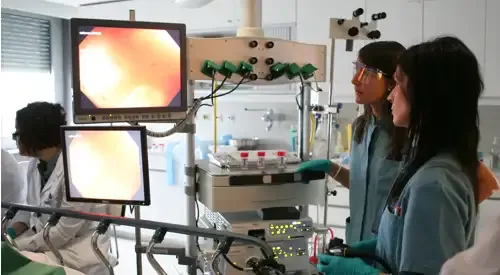Constipation
"Colonoscopy is recommended for all patients with constipation who have: anemia, rectal bleeding, obstructive symptoms, recent onset of constipation, weight loss, rectal prolapse, change in stool size, or who are over 50 years old and have not been screened for colon cancer".
DR. RAMÓN ANGÓS
SPECIALIST. DIGESTIVE DEPARTMENT

The term constipation more than an illness itself refers to each individual's appreciation of his or her bowel habit. Given the wide range of normal bowel habits, it is very difficult to define constipation accurately.
In practice, the frequency of defecation is used as a more objective criterion. An individual who has less than three bowel movements per week is considered constipated.
However, this criterion is not sufficient in itself, since many patients with constipation refer to a normal frequency but with other subjective discomforts, such as excessive straining, very hard stools or a feeling of incomplete evacuation.

What are the symptoms of constipation?
- Feeling of incomplete evacuation.
- Pain associated with bowel movements.
- Sensation of fullness in the stomach.
- Swollen belly.
- Pain in the low part of the back, fatigue, headaches.
The most common symptoms are:
- Less than 3 bowel movements per week.
- Feeling of incomplete evacuation.
- Pain associated with bowel movements.
- Swollen belly.
Do you have any of these symptoms?
You may suffer from constipation
What are the causes of constipation?
The most frequent cause of constipation today is what is called simple chronic constipation and is mainly due to dietary factors, the main cause being a lack of fiber in the diet.
Other times constipation is related to different diseases that the person suffers and is a frequent symptom in patients with diabetes and thyroid diseases.
Some medications used to treat pain, depression and some heart diseases can also cause constipation.
The most important is constipation of recent appearance, especially when it is associated with pain, blood in the stool or weight loss, since the cause can be a tumor in the intestine.
How can constipation be prevented?
- Get in the habit of drinking plenty of fluids during and between meals, at least 3 to 5 extra glasses of water per day, especially in the morning.
- At least one and a half liters of water should be drunk per day.
- Add to your diet fruits with skin, vegetables, preferably raw and foods rich in fiber (vegetables, whole wheat bread...).
- Eat slowly and chew your food well.
Increase your daily activity, including walking at least 30 minutes a day or other forms of exercise. - Set a time each day that is quiet and uninterrupted for going to the bathroom. Try to evacuate when you feel the need.
How is constipation diagnosed?

Given the number of circumstances that may be related to the appearance of constipation, it should be the doctor, after knowing the dietary habits, the taking of drugs and the existence of other diseases, who determines what studies are necessary to do. One should ask about the intestinal habit: frequency and consistency of bowel movements. A sudden change with no apparent cause that justifies it is reason to study it to rule out organic disease.
In the event that it seems that the most likely cause may be a tumor, the intestine must be studied from the inside by means of a colonoscopy.
Constipation represents a very frequent reason for consultation. Any person at any age can present seasons of constipation, especially coinciding with changes of diet or travel. Older people or those with little activity present this disorder more frequently.
How is constipation treated?
Treatment of constipation depends primarily on the cause of the constipation.
Most of the time it will be enough to add fiber to the diet. If it is related to taking drugs, and these can be changed for others, it will be advisable to do so.
In other occasions it can be necessary to resort to the surgery.
The Department of Digestive
of the Clínica Universidad de Navarra
The Digestive Department of the Clinica Universidad de Navarra is composed of a multidisciplinary team of specialists who are experts in the diagnosis and treatment of diseases of the digestive tract.
Our objective is that each diagnosis be carefully established and the treatment plan adjusted to each patient.

Why at the Clinica?
- Medical specialists who are national references.
- Specialized nursing team.
- Endoscopy Unit and High Risk Digestive Tumor Prevention and Consultation Unit to offer the best care to our patients.















